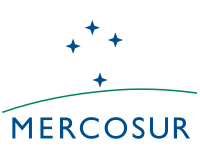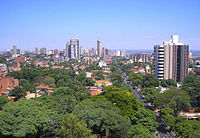This article has multiple issues. Please help improve it or discuss these issues on the talk page. (Learn how and when to remove these messages)
|

Mercosur Cities Network, or simply Mercocities, is a network that unites a group of municipalities of the countries that participate in the Common Market of the South (Mercosur), whether they are members or associates. This organization of cities aims to promote their integration on a regional scale and stimulate development and cooperation between them.
It currently comprises 353 municipalities of the following South American countries: Argentina, Brazil, Bolivia, Chile, Colombia, Ecuador, Paraguay, Peru, Uruguay and Venezuela.
History

The idea of creating a Mercosur association of cities came up during the seminar "Mercosur: Opportunities and Challenges for Cities" held in March 1995 in Asunción, Paraguay. The mayors who participated in the meeting, which was convened by the Union of Ibero-American Capital Cities–Southern Cone Sub-region, signed the so-called Declaration of Asuncion, where they expressed the need to create a forum for cooperation among municipalities.
In July 1995, the Porto Alegre Commitment (Brazil) was signed, which defined the main objectives of the new organization. Finally, in November of the same year, she signed the Founding Act of the Mercocities, in Asunción.
The founding members were the cities of Asunción, Rosario, La Plata, Cordoba, Buenos Aires, Florianópolis, Porto Alegre, Curitiba, Rio de Janeiro, Brasília, Salvador and Montevideo.
Instances of Mercociudades
Art. 8 of the Statutes stated different instances of work:
Summit of Heads of Government
The Assembly is the highest body for deliberation and direction of our Network. It is made up of mayors, mayors and prefects of the associated cities and its sessions are led by the President of Mercociudades. It meets once a year at the Mercocities Summit. During the Assembly the annual Work Plan is approved, the authorities of that new period assume, and it is at the same time an instance of contact with various regional and world organizations interested in carrying out joint actions. The Assembly concludes with a political declaration.
Council of Mercociudades
It is the highest governing body between assemblies and is made up of two cities from each full member country of Mercosur and one city from each associated country, those that make up the Board of Directors and that which is exercised by the Executive Secretariat.
Council 2019–2020:
- Argentina: Buenos Aires, Córdoba, Santa Fe, Avellaneda (Santa Fe), General Alvear, Hurlingam, San Justo, Villa María
- Brazil: Foz de Iguazú, Porto Alegre, Santana de Parnaíba, Sāo Leopoldo, Sāo Paulo.
- Paraguay: Asunción, Itá and Lambaré.
- Uruguay: Canelones, Colonia, Lavalleja, Maldonado, Montevideo, Paysandú, San José and Tacuarembó.
- Bolivia: La Paz, Sucre and Tarija.
- Colombia: Medellín.
- Chile: Concepción, Coquimbo, Quilpué, Quilicura, Peñalolén, Puerto Montt and Valparaíso.
- Ecuador: Cuenca and Río Bamba.
- Peru: Los Aquijes, Parcona, Pueblo Nuevo, and Santiago de Ica.
Executive Direction
It is made up of three cities: the city that exercises the Executive Secretariat, the city that exercised it in the immediately preceding period, and the city that is close to exercising it. It is a support agency for the Executive Secretariat in the coordination work of the Network.
Executive Direction 2019-2020: Asuncion, La Paz and Tandil.
Presidency
As the official space of the Network, the Presidency works jointly with the various instances of Mercociudades, specifically convening and presiding over the work meetings of the Council, those of the Executive Directorate, and those of the General Assembly of Members. In each period, this Presidency carries out activities based on a work plan approved at the Network's annual summit.
President 2020: Oscar Rodriguez, Major of Asuncion, Paraguay.
Thematic Vice Presidencies
The thematic vice-presidencies participate with the right to speak and vote in the Executive Directorate, represent the Network in various regional and international spaces, and assist the President in his responsibilities. They articulate and mobilize the member cities, coordinators, or members of the thematic instances of Mercociudades, related to the thematic area they represent.
Thematic Vice Presidencies 2019-2020:
- Sustainable Urban Development And Climate Change: Esteban Echeverría (Argentina) And Prefeito De São Leopoldo (Brazil).
- Governance And Cultural Integration: La Paz (Bolivia).
- Institutional Relations: Montevideo (Uruguay).
- Urban Economy: Porto Alegre (Brazil).
- Social Development And Health: Tandil (Argentina).
Executive Secretary
As the official space of the Network, the Executive Secretariat works jointly with the various instances of Mercociudades, specifically convening and presiding over the work meetings of the Council, and those of the General Assembly of Partners. In each period, this Secretariat carries out activities based on a work plan approved at the Network's annual summit. Its mandate is for one year and begins from the date the General Assembly is held.
Collegiate of Coordinators of Thematic Units: Thematic Units
The thematic instances disseminate successful experiences, contribute to the formulation of public policies, and promote research. They arise responding to the need of the member cities of the Network to work in various areas of high concern and interest. Currently, it has 15 Thematic Units and 7 Work Groups and Commissions.
Permanent Technical Secretariat
The Permanent Technical Secretariat of Mercocities is based in Montevideo and is an advisory body to the Executive Secretariat. Its creation was due to the need to develop the institutional memory of the Network; support and advise the technical and administrative work of the Executive Secretariat; follow up on issues and discussions of the integration process, and liaise with the MERCOSUR Secretariat.
Membership
The Mercocities are:
Argentina
Bolivia
Brazil
Chile
Colommbia
Ecuador
Paraguay
Peru
Uruguay
Venezuela
References
- "Visión y Misión".
- "Autoridades" (in Spanish).
- "Estatutos" (in Spanish).
- "Members" (in Spanish).
External links
- Official website (in Spanish)
- Pages about the Mercocities (in Spanish)
| Mercosur · Mercosul | |||||
|---|---|---|---|---|---|
| (Southern Common Market) | |||||
| Politics | |||||
| Members |
| ||||
| Observers | |||||
| Institutions | |||||
| Currencies | |||||
| Integration | |||||
| Relations | European Union | ||||